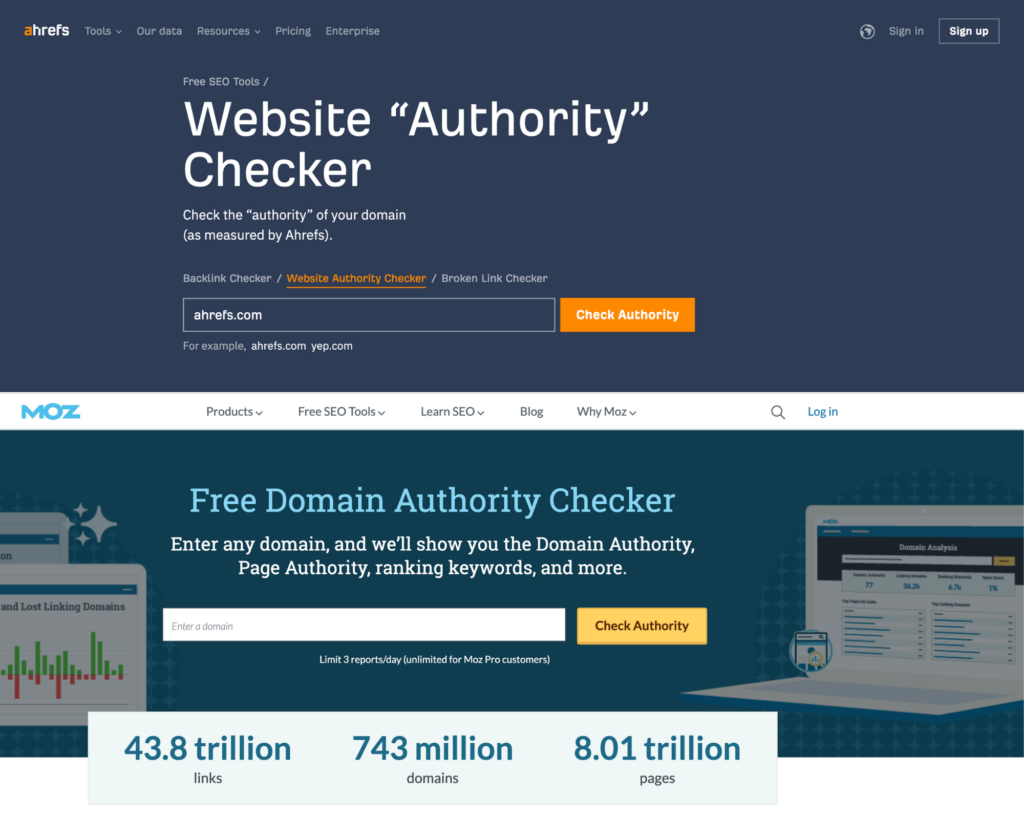
If you’re involved in the world of SEO, you know how important it is to have a strong online presence. To do this, you need to understand the various parameters that are important for a domain to be ranked by search engines as an authoritative resource. To determine the authority and quality of a domain, there are two important and popular metrics – Domain Rating (DR) and Domain Authority (DA).
DR and DA are both used to measure the authority and strength of a website, but they have some key differences that can be confusing for those new to SEO. In this article, we’ll explain the difference between DR and DA and discuss which metric is more important for SEO.
What Is Domain Rating?
Domain Rating (DR) is a metric developed by Ahrefs, a popular SEO tool, to evaluate the strength of a website’s backlink profile. In simple terms, DR measures the quality and quantity of links pointing to a website from other websites.
To calculate DR, Ahrefs considers various factors such as:
- • number and quality of dofollow links leading to the main site;
- • Domain Rating of all websites linking to the main website;
- • number of other sites linking to the main site;
- • number of pages from the domain point to the main site;
- • number of unique referring IPs;
- • etc.
Why is this important for SEO? The answer lies in the fact that backlinks are one of the most important ranking factors for search engines. When a website links to another website, it’s essentially vouching for the content on that site. The more high-quality and diverse backlinks a website has, the more likely it is to rank higher in search engine results pages (SERPs). This is because search engines like Google see backlinks as a vote of confidence from other websites. If a lot of high-quality websites are linking to your website, it must be a valuable and trustworthy resource. For details, you can look at Google Backlinks Guide.
For example, let’s say you’re researching a topic and come across two websites with similar content. Website A has several links from well-respected websites in its niche, while Website B has only a few links from unknown sources. Which website would you trust more? Most likely, you would trust Website A more, as it has a stronger backlink profile. Search engines work in a similar way – they use the strength of a website’s backlink profile to determine its authority and trustworthiness. This is why DR is such an important metric for SEO.
It should also be clarified that Ahrefs provides a DR score for every website it analyzes. This score ranges from 0 to 100 (with higher scores indicating stronger backlink profiles) and it’s based on the strength of a website’s backlink profile audit as a whole, rather than individual pages on the site.
What is Domain Authority?
Domain Authority (DA) is a metric that was created by Moz to measure the overall quality and authority of a website. Like DR, DA is also based on a website’s backlink profile, but it takes into account other factors as well (the total number of factors reaches 170). Some of the factors that Moz considers when calculating DA include:
- • number and quality of backlinks;
- • age of the domain;
- • content on the website;
- • website’s overall structure;
- • user experience;
- • organic traffic patterns;
- • linking root domains;
- • social signals;
- • etc.
Similar to DR, DA is scored on a scale of 0 to 100, with higher scores indicating a stronger website. However, unlike DR, DA takes into account the overall quality of the website, rather than just its backlink profile. This means that a website with a lower DA score can still have a high DR score if it has a good-quality backlink profile.
Having said that, having a high DA does not mean that your site will rank high on Google’s ranking systems or other search engines. The opposite is true: high rankings on Google or other search engines mean a high DA score.
So why is DA important for SEO? Similar to DR, DA is used to determine the authority and trustworthiness of a website. And the best thing about DA ranking is that it is established after a quantitative and qualitative analysis of the main SEO factors. This means that while DA is limited to predictions, you will at least be comparing possible domain ranking performance based on actual SEO parameters.
You can, for example, use Domain Authority also along with other parameters to track how your SEO campaigns are performing compared to your closest competitor.
And even if you’re performing poorly, you can still rely on domain authority to help you catch up. This is where you gradually optimize your site with effective SEO tactics like content marketing and high-quality inbound links, while Domain Authority helps you keep track of your progress. And we at our SEO company will be happy to help you with this.

What is the Difference Between Domain Rating And Domain Authority?
While both Domain Rating and Domain Authority are used to evaluate the strength of a website, there are some key differences between the two domain metrics.
- • Calculation Method: Domain Rating is calculated by Ahrefs, while Domain Authority is calculated by Moz. Each tool uses a different algorithm and data set to calculate the domain score, which can result in slightly different scores for the same website.
- • Focus on Backlinks: Domain Rating primarily focuses on a website’s backlink profile, while Domain Authority in addition to links takes into account other factors such as content quality and user experience. This means that a website with a strong backlink profile but the poor content quality may have a high DR score but a low DA score.
- • Scoring Scale: Both metrics are scored on a scale of 0 to 100, but the scoring scale is not directly comparable between the two metrics. A website with a DR score of 60 may not necessarily have the same level of authority as a website with a DA score of 60.
What is the Similar Between Domain Rating and Domain Authority?
Despite their differences, there are several similarities between Domain Rating and Domain Authority:
- • Both metrics are based on links: Both metrics consider links. DA examines top backlinks, toxic backlinks, spam links, and lost links. DR focuses on backlinks, or more precisely, authentic dofollow backlinks.
- • Both are scored on a 0-100 scale: Both metrics are scored on a scale of 0 to 100, with higher scores indicating a stronger website. While the scoring scales are not directly comparable between the two metrics, a higher score on either metric is generally a good sign for SEO.
- • Both are used for SEO: Both Domain Rating and Domain Authority are used by SEO professionals to evaluate the strength of a website and inform their SEO strategies.
- • Tool Availability: Both metrics can be checked for free. Links to pages to check: Ahrefs Domain Rating and Moz Domain Authority.
- • Both are not the only factor in SEO success: While both metrics are important for SEO, they are not the only factors that determine a website’s success in search engine rankings. Other factors such as content quality, user experience, and technical SEO also play important roles.
Understanding the similarities and differences between Domain Rating and Domain Authority can help you better evaluate the strength of your own website and inform your SEO strategy.
Which is More Important: Domain Rating or Domain Authority
The answer to this question is not straightforward, as both metrics are important for SEO and can provide valuable insights into the strength of a website.
In the field of digital marketing, Domain Rating is considered more crucial than Domain Authority. Before the advent of DR and DA, PageRank was the sole algorithm that determined a website’s ranking on Google. This algorithm relied entirely on the quality of a website’s backlinks. The higher the quality of backlinks, the more likely a website was to rank higher on Google.
However, Google no longer uses PageRank. Nevertheless, backlinks still play a significant role in determining a website’s ranking on Google. Unlike DR, DA is calculated based on multiple factors such as spam score, domain age, website traffic, and social media presence, rather than solely on backlinks. And the argument is that DA is susceptible to manipulation.
For example, an old website may receive a high DA score despite having a low ranking on SERPs, while another website with high paid traffic that does not originate from Google may also have a high DA score. Additionally, a website may have a considerable amount of direct traffic despite being poorly optimized for search engines, resulting in a lower SERP ranking. Consequently, DA is considered a comparative metric among websites. In contrast, Ahrefs DR, which solely focuses on evaluating backlinks, is less prone to manipulation. Similar to Google PageRank, it utilizes a logarithmic scale.
However, if your goal is to improve your website’s SERP ranking, prioritizing overall SEO enhancements should take precedence over boosting DA and DR scores. Ultimately, improving your website’s SEO will also result in higher DA and DR scores.

Best Tips to Increase Your Website’s DA and DR
Improving your website’s Domain Rating and Domain Authority takes time and effort, but there are several steps you can take to help boost these metrics.
How to Increase Domain Rating
A website’s Domain Rating is largely determined by its backlink profile. To increase your website’s Domain Rating, you should focus on building high-quality and relevant backlinks. Here are some tips:
- • Create valuable and shareable content that other websites in your niche will want to link to.
- • Reach out to other websites and offer to guest post or collaborate on content.
- • Use internal linking to help distribute the link equity throughout your website.
It’s also important to note that your website’s Domain Rating is calculated on a logarithmic scale, meaning it becomes increasingly difficult to improve your score as you get higher. So, don’t get discouraged if you don’t see significant improvements right away.
How to Increase Domain Authority
Domain Authority is determined by several factors, including your website’s backlink profile, content quality, and user experience. While improving your website’s Domain Authority can be a more complex task, here are some general tips to get you started:
- • Focus on creating high-quality content that’s well-written, informative, and relevant to your target audience.
- • Pay special attention to SEO content optimization by using relevant keywords and optimizing your on-page elements, such as titles, meta descriptions and headers.
- • Ensure your website is technically sound by monitoring your site’s performance, fixing broken links and errors, and optimizing your website’s structure and metadata.
- • Provide a good user experience for your visitors by making sure your website is easy to navigate, loads quickly, and provides a seamless experience.
If you want to dive deeper, check out our article about how to increase the Domain Authority of your website.
Remember, both Domain Rating and Domain Authority are important metrics for your website’s SEO performance, so it’s worth investing time and effort into improving them.
DA vs DR: Final thoughts
After reviewing the differences and similarities between Domain Rating and Domain Authority, it’s clear that both metrics play an important role in evaluating a website’s SEO performance. While Domain Rating measures the strength of a website’s backlink profile, Domain Authority provides a more holistic view of a website’s SEO performance, taking into account various factors beyond just the backlink profile.
To improve both metrics, it’s important to focus on building high-quality backlinks from reputable sources, creating high-quality content, optimizing your website’s structure and metadata, and providing a great user experience.
At Mellow Promo, we offer SEO services that can help you improve both your Domain Rating and Domain Authority. Our team of experienced professionals can help you identify high-quality backlink opportunities, create engaging content, and implement best practices to boost your website’s SEO performance.
In conclusion, understanding the differences between Domain Rating and Domain Authority can help you create a more effective SEO strategy for your website. By focusing on building high-quality backlinks and providing great content and user experience, you can improve both metrics over time and drive more traffic to your website. Contact us at Mellow Promo to learn more about our link building services and how we can help boost your website’s SEO performance.
FAQ
Is Domain Rating the same as Authority score?
No, Domain Rating and Authority Score are two different metrics used to evaluate a website’s SEO performance. Domain Rating is a metric developed by Ahrefs that indicates the strength of a website’s backlink profile, while Authority Score is developed by Moz which predicts a website’s performance on search engines.
What is the difference between DA and DR in SEO?
Domain Authority (DA) and Domain Rating (DR) are both metrics used to evaluate a website’s backlink profile. However, DA takes into account various other factors such as content quality, on-page optimization, and user experience, while DR focuses primarily on the quality and quantity of a website’s backlinks.
What is a good score for Domain Authority?
A good score for Domain Authority depends on your industry and competition. However, generally speaking, a score of 50 or higher is considered good, while a score of 60 or higher is considered excellent.
Is Domain Authority a Google ranking factor?
No, Domain Authority is not a direct Google ranking factor. However, it is a useful metric to evaluate a website’s SEO performance and can indirectly impact a website’s ranking by influencing factors such as backlink quality and content quality.





